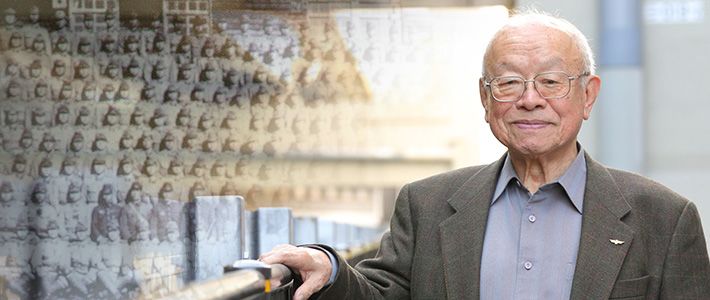
A Blessed Life: Taiwanese Soldier Who Fought for Japan Recounts His “Good Fortunes”
Society- English
- 日本語
- 简体字
- 繁體字
- Français
- Español
- العربية
- Русский
At a lecture held on a January weekend in Chūō, Tokyo, Go Masao told the audience of around 30 people: “I’m often asked to speak by young people because I’ve had some rather unusual experiences in my life.”
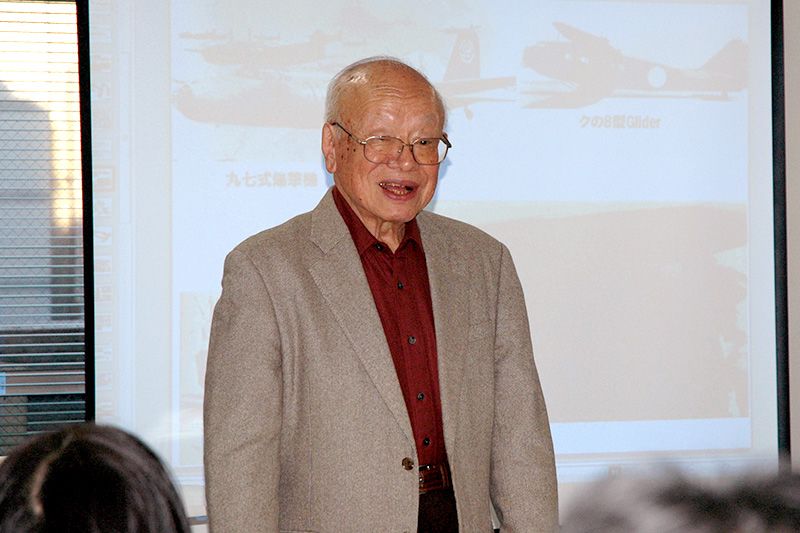 Go Masao explaining his wartime experiences. (© Masuda Miki)
Go Masao explaining his wartime experiences. (© Masuda Miki)
At the beginning of his talk, the audience appeared surprised by the gap between Go’s age and his sprightly demeanor. Over the next two hours, he recounted his experiences during and immediately after World War II, explaining how he served as a Taiwanese member of the Japanese army and noting that even after the hostilities ceased, the shadow of war continued to hover over his life.
Absorbing the Japanese Culture of the Time
Go was born in 1927 in the southern part of Japanese-ruled Taiwan. Both of his parents were Taiwanese, but the culture of the time, including the administrative system, were all Japan-based.
At home he spoke Japanese with his father, who had attended a Japanese college. In nursery school, Go became familiar with all of Japan’s seasonal holidays and studied alongside Japanese classmates in elementary school. Today he humbly admits that his language ability in Taiwanese “is at the level of a child.”
In the spring of 1941, at the age of 13, Go moved to Japan to continue his studies in middle school. Quite naturally, given the atmosphere of the time, he became a gunkoku shōnen (militarist youth). Three years later he enrolled in the inaugural class of the Japanese army cadet school without asking his parents’ permission and then enlisted in the Nagaoka educational corps of the Mito aviation and communications school. After that, he became a wireless operator for heavy bombers, and at the time of the war’s end, on August 15, 1945, he was stationed at the Sentoku Air Field on the Korean Peninsula, where he had volunteered to carry out a kamikaze mission.
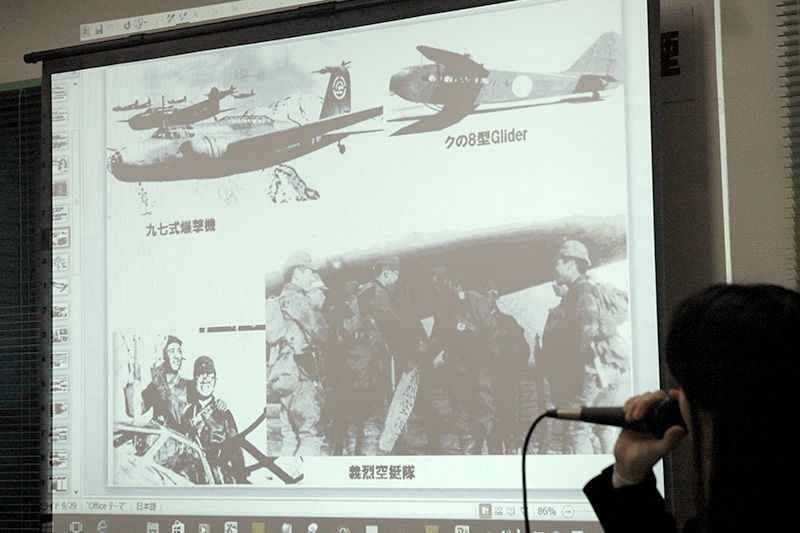 Go uses many photos in his presentation. Here he explains the heavy bomber that his squadron flew during the war. (© Masuda Miki)
Go uses many photos in his presentation. Here he explains the heavy bomber that his squadron flew during the war. (© Masuda Miki)
Two Years in a Soviet Prison Camp
But the war did not end for Go in 1945. After demobilization, when he and his comrades were heading toward the 38th parallel on their intended journey back to Japan, they were captured by the Soviet army. The men were transported to a prison camp in Kazakhstan, where they were forced to toil for long hours in semidesert conditions.
Go’s muscular 170-centimer frame, which he had built up through the martial art of kendō, steadily wasted away from malnutrition. The conditions were also terribly unsanitary. The prison camp for 1,600 men had only a single toilet and just one bathing facility, so the prisoners only bathed two or three times a year. In these horrendous conditions, false rumors regularly spread among the prisoners that they would soon be released. This situation gradually took a toll on the mental health of Go and his fellow prisoners. Fortunately, he was released after two years, but by that time he weighed a mere 40 kilograms. “If I had stayed at the camp for another year,” he recalls, “I would have died for sure.”
Go was treated as a Japanese upon repatriation and sent from the Soviet Union to the Japanese port of Maizuru on the Sea of Japan coast. If he had said that he was Taiwanese, he would have been conscripted by the Chinese army, but he used the Japanese name of Ōyama Masao and gave his Japanese address. He returned to Japan and experienced the peace that he had known before leaving for war, becoming reunited with the young woman for whom he had a secret affection.
The Indelible Impact of the War
But the shadow of war continued to hang over his life.
Postwar Taiwan entered a period of tumult. After the end of Japanese rule, the island came to be ruled by Chang Kai-shek’s Kuomintang Party, which had fought against Japan during the war. At first, local residents warmly welcomed their new rulers as compatriots, but they became subject to discriminatory treatment and subsequently revolted. This culminated in the February 28 Incident, an anti-government uprising that was violently repressed. In the wake of the revolt, the Kuomintang-led government imprisoned elites from the era of Japanese colonial rule, many of whom were eventually killed.
Go thought of going back to Taiwan, where his family was living, but his father strongly advised him to resume his studies in Japan and not return home. He threw himself into his studies alongside younger classmates and made up for the time he had lost during the war by completing two years of high school and four years of university.
His former Taiwanese classmates in Japan who had gone on to university without fighting in the war all headed to the continent in hopes of helping to build the new Chinese nation around 1952 or 1953. Go recalls that, “in almost every case, I never heard from them again”; they were probably killed amid the chaos of the time, he surmises. The social turbulence in Taiwan would last until martial law was dissolved in 1987.
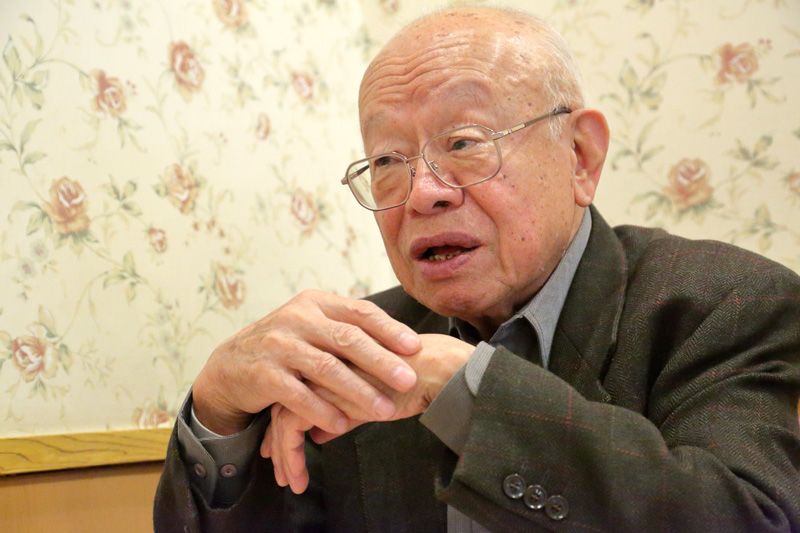 Go recalls how many of his friends lost their lives in the turbulent postwar period in Taiwan. (© Hanai Tomoko)
Go recalls how many of his friends lost their lives in the turbulent postwar period in Taiwan. (© Hanai Tomoko)
Troubles Seem “Fortunate” in Retrospect
After graduating from university, Go worked for the credit union Yokohama Kagin, based in the city of Yokohama, eventually becoming its managing director. Today his business card lists the many positions he currently holds in a number of organizations. He also played a key role in getting NHK to hold its Nodo jiman singing competition TV program in Taiwan, which came to fruition in 2011. Anyone in Yokohama’s Chinatown who is involved in business or cultural ties between Japan and Taiwan is sure to know about Go.
In his private life as well he has put down roots in Japanese society, marrying a Japanese woman and becoming the parish representative of Iseyama Kotai-jingu, a tutelary shrine located in Yokohama. “I’m probably the only foreign national serving as a parish representative in Japan,” he says with pride.
In recounting his wartime experiences, one word that the soon-to-be 90-year-old often uses is “good fortune.” His audiences are often surprised that Go even describes the hardest period of his life, his incarceration in a Soviet camp, as his “greatest good fortune.”
“If I had returned to Taiwan after 1945, it’s likely that I would have lost my life in the turmoil of the February 28 Incident because of my service in the Japanese army.” Many chance incidents allowed him to avoid that fate. Some of the fortunate things that happened, at least in retrospect, included his capture after the war by Soviet troops, his return to Japan after his release, and his decision to resume his studies after a five-year hiatus.
But not everything went so fortunately after the war. It was particularly hard for him to accept that he was deemed not eligible, as a non-Japanese national, to receive government compensation for his internment in a Soviet camp, despite having fought for Japan. Nevertheless, whenever recounting his past experiences he is quick to emphasis his good fortune, noting that he would surely have been killed in Taiwan had he returned there.
Go says that he will continue to recount his experiences as long as young people are interested in hearing about them. In his talks, he never preaches about the importance of “never going to war again.” This is because he does not see the wartime period as a curse, nor does he look for someone to blame. Instead, he takes an authentic and frank look at his memories of the war and its aftermath, describing them as a blessing. And he plans to continue to recount his tale to audiences in Japan.
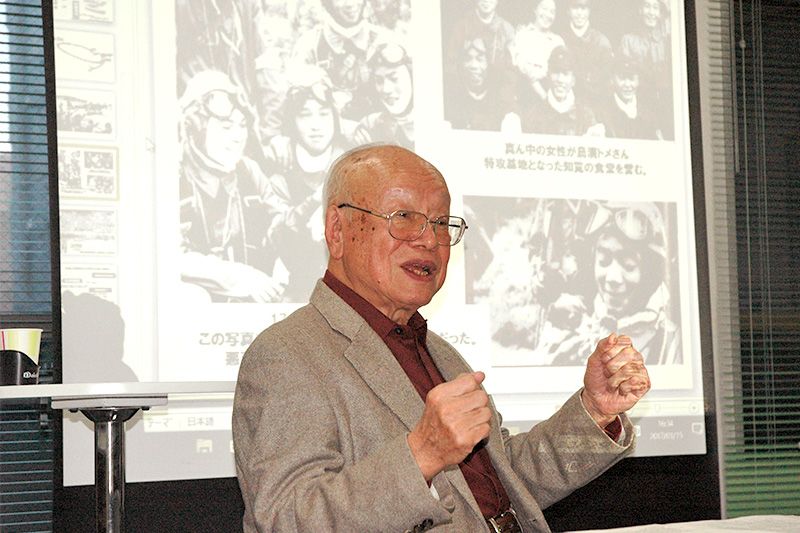 Go intersperses his lectures about his experiences with humorous remarks. (© Masuda Miki)
Go intersperses his lectures about his experiences with humorous remarks. (© Masuda Miki)